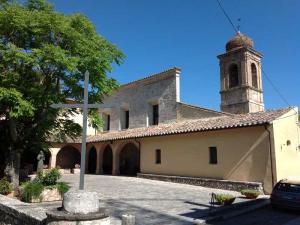
La tradizione vuole che sia stato fondata da San Francesco nel 1213, nel corso di una sua visita a Stroncone. Il luogo ha subìto molti rimaneggiamenti nel corso dei secoli. Il convento è situato poco fuori le mura della città, tra oliveti e boschi, in un luogo che domina la vallata circostante. All’esterno si possono …
DETTAGLI
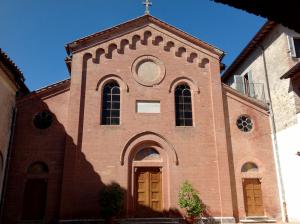
Legend holds that this convent was donated to Saint Francis by a Perugian nobleman. Saint Egidio, third among Francis’ followers, passed most of his life here (cf. FF 1868); his remains are conserved in the Oratorio di San Bernardino. Monteripido is currently the seat of a Franciscan community dedicated to parish and university ministry. Source: …
DETTAGLI
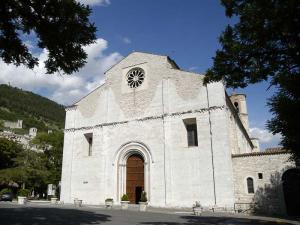
Federico Spadalonga was the first to take in and dress – with his own tunic – the pilgrim Francis after the saint renounced his worldly goods in Assisi’s piazza (cf. FF 1045). This church, built in the 8th century in the Romanesque-Gothic style, holds a wall of Spadalonga’s house and an interesting fresco cycle by …
DETTAGLI
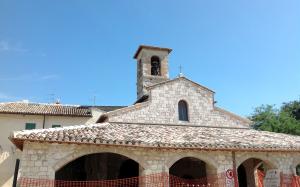
This church is along the leg to Foligno, near Matigge. Nearby there was once a leprosarium, where Francis cared for the sick (FF 1570). Today, the leprosarium is abandoned but there remains a pretty church covered in votive frescoes. In 2012, restoration work began on the church, which is still closet to the public. For …
DETTAGLI
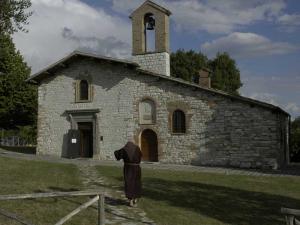
Located along the route of the Way toward Biscina, this 11th century church is dedicated to Our Lady of Victory to commemorate the victory over the Saracens. According to legend, Francis tamed the wolf on this spot, which was then granted to him to found the first Franciscan community in Gubbio. Source: “La via di …
DETTAGLI
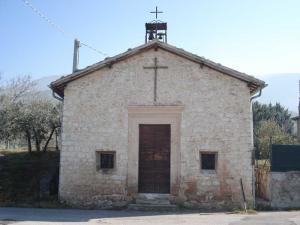
This church is a short distance from the route of Saint Francis’ Way before Trevi and is the spot where the temptation of Saint Francis took place during a night in which he had stopped here to pray. Here is also where Friar Pacifico had his vision of the vacant throne, lost to Lucifer and …
DETTAGLI
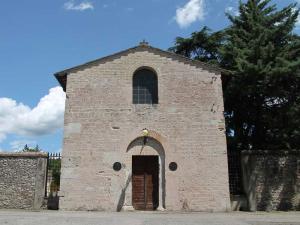
Located outside of town, currently attached to the cemetary, this building was built between the 11th and 12th centuries and was where the young Claire of Assisi, upon the request of Saint Francis, was harbored to protect her from her family who attempted repeatedly, at times violently, to force her to return home. Source: “La …
DETTAGLI
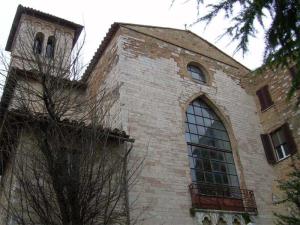
One of the oldest Franciscan communities in Italy, this church was built 1212 and is now the home of the textile and weaving museum-workshop, Giuditta Brozzetti. Source: “La via di Francesco” – Edizioni San Paolo S.r.l.
DETTAGLI
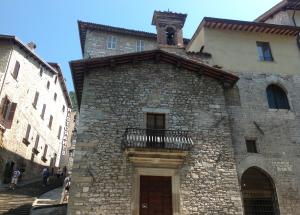
Near Porta Romana, this church was built in 1600, on the spot where, according to legend, the wolf tamed by Francis had his den and where he was buried. (cf. FF 1852). At the beginning of the 20th century during restoration work inside the church, the remains of a wolf were found. Source: “La via …
DETTAGLI
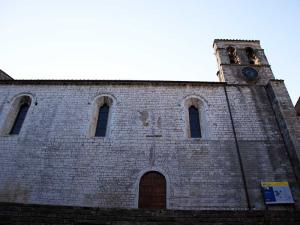
The church of San Francesco was built between the end of the 13th century and 1338 to commemorate Francis’ visit to Piediluco, as explained in the inscription on the facade. The church contains important artworks from the 1400s and 1500s and, on the portal, a relief pattern of fish and fishing gear recalls the proximity …
DETTAGLI
© FRANCESCO'S WAYS | Privacy Policy | Crediti
